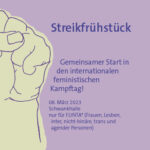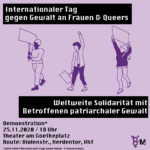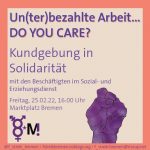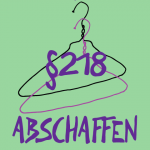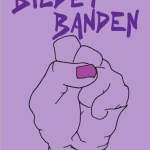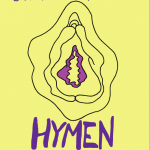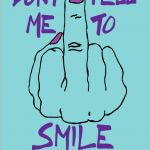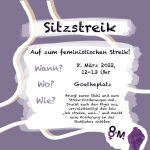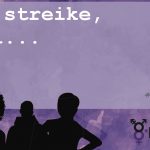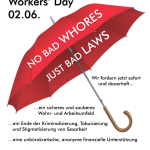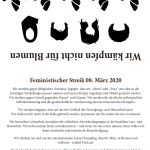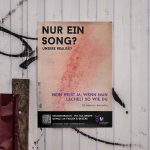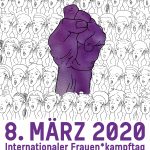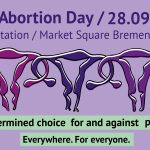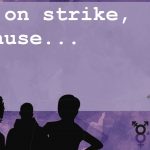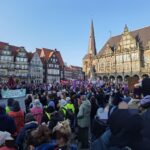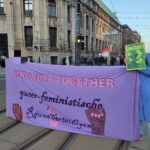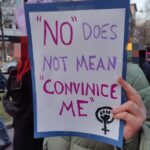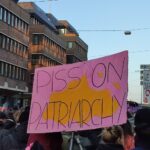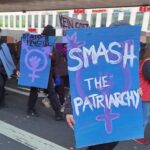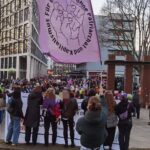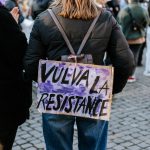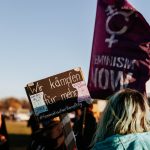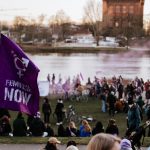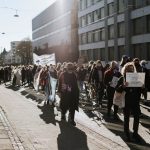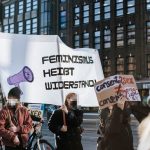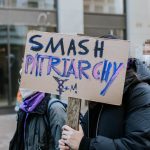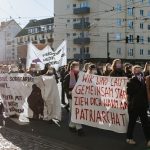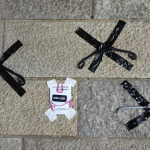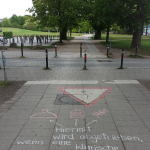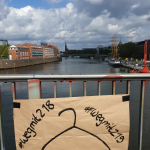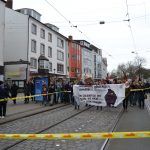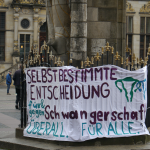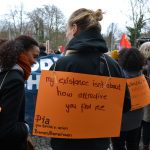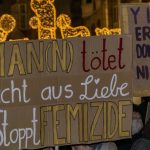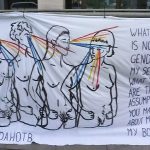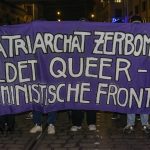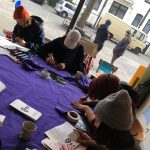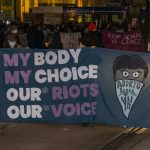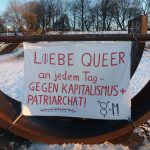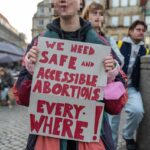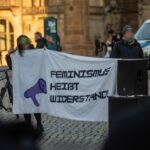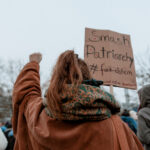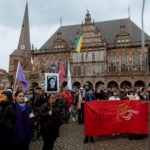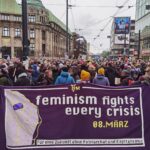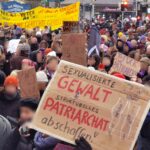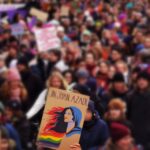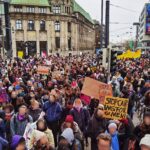Speech from Feministischer Streik Bremen & Netzwerk Stoppt Femizide Bremen
Almost every day, a FLINTA* person is murdered because of their assignment to the female gender. It is mostly cis men who murder FLINTA* people, i.e. women, lesbians, inter*, non-binary, trans* and agender people.
They kill people out of an attitude of entitlement and dominance. People who do not fulfil their ascribed role expectations. Femi(ni)cides and transcides are murders of FLINTA for gender-specific reasons. They are an extreme form of patriarchal violence.
Every 12 minutes, a girl or woman is murdered by partners, ex-partners or family members worldwide. The recently published statistics from Germany speak of 360 femicides in 2023. Almost one femicide every day.
In addition, there is a high number of unreported cases that have not been statistically recorded:
– Because the people murdered were homeless or
– because they were refugees
– the murder did not make it into the media
– because murders of non-binary, trans*, inter* and agender people are often not even recorded as femi(ni)cides or transcides.
The murders at FLINTA are not isolated cases, tragic relationships or family dramas. Femi(ni)cides are systematic, as is the lenient treatment of the perpetrators in court and in the media. Time and again, there is a perpetrator-victim reversal in which the focus is placed on the perpetrator’s experience.
If the perpetrators and victims are not white, this leads to a racist externalisation of the violence. The acts are portrayed as honour killings and an expression of purely culturally or religiously determined contempt for women.
Non-white FLINTA* people are also not safe in shelters and are particularly exposed to racist discrimination and police and state violence. We recently saw this in the deportation of a woman living in a women’s refuge with her two children.
The network ‘Stop Femicide Bremen’ and the Feminist Strike Bremen have called for today’s day of action to set an example and unite.
Together we want to commemorate our murdered brothers and sisters worldwide and share our pain and anger with you. We mourn for those who cannot be here. We are afraid that more of us will die. And we look critically and with concern at the growing anti-feminism and the normalisation of extreme right-wing positions in politics.
Patriarchal violence also manifests itself in state control. We see it, for example, in the reduction of financial support for violence protection centres. And in the continued criminalisation of abortions.
The extent of the violence makes us angry. We are angry because patriarchal violence is so normalised. We are angry that FLINTA*s are systematically exploited and forced into dependency structures. We are angry because not every single femicide triggers a nationwide scandal.
Patriarchal violence affects us all!!! But it affects us all in different ways and must be addressed internationally, intersectionally and in solidarity. There can be no freedom, no safety for any one person until we are all free and safe. So we will be loud, we will be angry, we will fight together!
Today, on the occasion of the International Day against Patriarchal Violence on 25 November, we demand…
– … an end to the glorification of the killings as a relationship or family drama by the media and the judiciary. Gender-specific murders are not isolated cases and must be labelled as femi(ni)cides!
– … that the sexist reporting and perpetrator-victim reversal is ended. No blaming FLINTA, but speaking out about patriarchal, male violence.
– … an end to the racist attempts at externalisation by the media and society.
– … (better) statistical recording of trans people. Killings of non-binary, trans*, inter* and agender people must be included in analyses and debates!
– … comprehensive protection against violence against FLINTA through the implementation of the Istanbul Convention, clear criminal prosecution and legal protective measures. This includes comprehensive, secure and long-term funding for violence protection programmes
– … unrestricted right to asylum for FLINTA* victims
– We demand an end to the oppression and exploitation of FLINTA* people in the patriarchy and an end to patriarchal violence.
Finally, we call on all of you: Organise. Form gangs. We need more feminist, solidary and internationalist self-organisation. We cannot rely on the state.
We are no longer waiting for your politics.
If you take one, we’ll all respond. Ni una menos, ni una mas.
Speech from Bethnahrin Frauen Union
Dear women, participants
and listeners,
Violence against women has been an omnipresent but often ignored problem worldwide for thousands of years. Since the establishment of patriarchal systems, women have been regarded as property, instrumentalised and systematically oppressed. This violence manifests itself in many different forms, but the underlying mentality remains the same – regardless of time, place or culture.
Whether in war zones, under authoritarian regimes such as the Taliban in Afghanistan, or in the everyday lives of women around the world, the forms of violence vary, but the pattern is the same. Examples such as the women under the Dominican dictatorship, the victims of the genocide of 1915 or today’s oppression in Iran illustrate this continuity.
Women of the Suryoye people, rooted in Mesopotamia for thousands of years, have experienced violence in the form of murder, dispossession and rape. Today, like many women around the world, they are under psychological pressure that paralyses their freedom and their will. This also applies to our sisters in Europe, America and Australia, who continue to be subjected to various forms of oppression.
Whether in Christianity, where women have been marginalised for centuries, or through Islamic policies that reinforce oppression, women of our people, as well as women in Lebanon, the Middle East and beyond, struggle daily against psychological and physical violence, homelessness, hunger and fear.
We demand the right to decide for ourselves what we wear, say and experience. We campaign for solidarity among women – because it is the only key to overcoming our problems.
Long live women’s solidarity!
Bethnahrin Women’s Union
Speech from Frauenrat Sêvê
Your war means our blood -With Jin Jiyan Azadî We defend ourselves
The ongoing wave of femicides and violent crimes against women in Turkey and other parts of Kurdistan is a shocking example of a system based on oppression harrowing example of a system based on oppression, violence and the perpetuation of patriarchal power structures. In 2024 alone, almost 300 women were murdered in Turkey, often in their own homes – a place that was supposed to provide protection should offer protection. Tragic cases such as the murder of the 8-year-old girl Narin Güran and Rojin Kabaiş, as well as the disappearances that have been two years of the unsolved disappearance of Kurdish student Gülistan Doku are not isolated events, but part of a systematic problem: a politically motivated systematic problem: politically motivated oppression that serves patriarchal and capitalist interests.
In Rojhilat, Iran, we see similar patterns of violence in which Kurdish women activists are persecuted, tortured and executed because their voices are perceived as a threat to the existing system. The uprising in 2022 following the assassination of Jina Mahsa Amini shows that state-sponsored murders and executions are primarily used to break resistance and resistance and consolidate patriarchal structures. The Kurdish freedom movement recognises this violence as an essential part of the patriarchal system and calls for a profound social transformation based on freedom, equality and the liberation of the people, equality and the liberation of women. The philosophy of Abdullah Öcalan, the leader of the Kurdish freedom movement, is central to this. He emphasises that the liberation of women is the key to a just and free society and that the patriarchal structures that oppress women oppress women also form the roots of capitalist modernity. In this context, the movement ‘Jin, Jiyan, Azadî’- ‘Woman, Life, Freedom’ – has emerged, which strives for a future without patriarchal and capitalist oppression and places women at the centre of the resistance.
Women’s resistance is a defence against the wars of the male-dominated system that they experience on a daily basis. The increasing violence against women, the systematic murders and the destruction of their rights are not accidental, but part of a global war global war against women’s freedom and lives. In this context, it is crucial to understand that that this is a defence that transcends national borders. The slogan ‘With Jin Jiyan Azadi we defend ourselves’ is not just a call for resistance, but a clear statement that women around the world are united in their struggles are united in their struggles and are fighting back against the oppression of a patriarchal and capitalist system. A tragic example of the extent of the despair caused by this system is the case in Sudan, where 130 women collectively committed suicide to escape the violent unit that uses rape as a war strategy. This shocking example illustrates the depth of violence against women and how it is misused as a weapon in wars and conflicts abused in wars and conflicts. It shows the desperate situation of many women who are fighting for survival in a war – a war that is not not only on the battlefield, but also in the patriarchal structures that exist worldwide. The Kurdish freedom movement and its philosophy offer a hope for the world: a society in which women are not only free free as individuals, but actively shape social transformation. Their courageous resistance, often at extreme risk and risks and personal sacrifice, is a strong signal of resistance beyond their region. The organisation of women and the struggle for gender justice, inspired by Öcalan’s philosophy, shows us ways in which patriarchal violence and capitalist violence and capitalist exploitation can be overcome.
It is time for us as women to organise at all levels, raise our voices and defend our right to a free life. It is a defence that concerns us not only as individuals, but as part of a collective resistance against the structural violence and oppression imposed on us all.
TJK-E / Kurdish Women’s Movement in Europe


